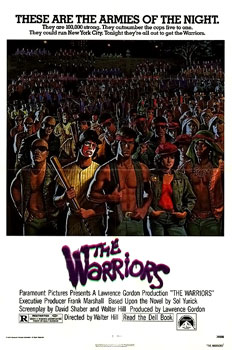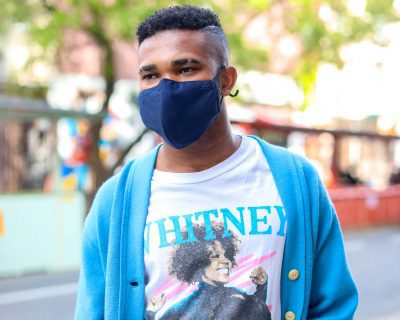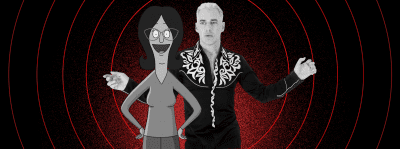David Patrick Kelly in this iconic 'Warriors, come out to play' scene (Courtesy Paramount Pictures)
‘The Warriors’ at 45: Filmmaker Walter Hill discusses his New York classic
'I wanted to make it about class,' Hill says of his gritty Homeric ode to New York (and gangs) of the 1970s
A little over a year ago, Walter Hill was invited to Il Cinema Ritrovato, a film festival in Bologna, Italy, for a screening of his cult classic “The Warriors.” When he arrived at the makeshift theater created for the occasion, he saw a giant screen and thousands of chairs set up in a public square draped in cathedrals.
“Good God, how many people are going to be here?” Hill asked the festival official with him. They said about ten thousand. Hill responded, “I hope it’s a good screening. That’s a lot of people to lay an egg in front of.”
Ten thousand people did come, and the make-up of the audience struck Hill. Many of the thousands were young, hardly people who would have watched the movie when it came out in 1979.
Hill is one of America’s foremost directors of action and Western projects like HBO’s “Deadwood.” He also helped create the buddy-cop comedy genre with “48 Hrs.,” which stars Eddy Murphy and Nick Nolte.
His Brooklyn classic “The Warriors” — a gritty take on Xenophon’s “Anabasis” — turns 45 on February 9, and celebrates with a the new 4K UHD release of the movie by Arrow Video.
“The Warriors” follows a Coney Island gang accused of killing a man named Cyrus (Roger Hill), a messianic figure who wanted to unify all of New York City’s gangs to bring down the city’s corrupt police. Hill and co-writer David Shaber turned author Sol Yurick’s novel into a class-conscious comic book epic, much to Yurick’s chagrin. Yet their creation’s magnetism is still creating new audiences who see themselves in the struggle of the movie’s multi-ethnic characters.
“I wanted to make it about class,” says Hill in an interview with Brooklyn Magazine about “The Warriors” at 45, how it got made and its enduring legacy.
This interview has been (very lightly) edited for concision and clarity.

‘The Warriors’ original movie poster
Why does “The Warriors” still resonate with people?
One, it’s a good story. It’s different. It’s not like your usual movie. At the same time, it’s a very approachable, comprehensible story. It’s about the most fundamental of human values that led us out of the caves, which are physical courage, loyalty, questions about who we are, and codes of conduct about how we behave with one another — all of which go unstated in the movie.
The gangs in the movie aren’t bad, per se.
It was one of the first gang movies that accepted the institution of gangs not as a hostile, antisocial force, but basically, as a defensive measure by people who had very little in life for their territory, their turf.
You told The Daily Beast you think the movie is “halfway a musical.” Will you elaborate on that?
I think what I was struggling to say was that it could be a musical, but I don’t know what the hell I was saying.
It’s funny you say it could be a musical because I’m sure you’re aware that Lin-Manuel Miranda is turning the book into a musical. Are you involved in the Broadway adaptation?
I’ve heard about it. I’ve heard the rumors, and he’s a great man. But I don’t know anything about it.
How is your movie different from Sol Yurick’s novel?
The book is written in the style of social realism from a very left point of view. That was just not the movie I wanted. I wanted a dystopian, near-future sensibility with a comic book style. I wanted it to have a real sense of propulsion because it’s a simple story, and the best way to deal with simplicity is to keep it moving. Sol didn’t like the movie and didn’t like me. We only met a couple of times but that’s usually what happens when you change things in a story, and I made it a very different movie than the book.
I wanted the movie to be in touch with the Greek literature that spawned it, so I went back and recreated things that were based upon incidents from Xenophon’s “March of the 10,000,” which is a great read, by the way. I guess I shouldn’t say this: It’s a lot better read than “The Warriors” novel.
Speaking of the comic book style of “The Warriors,” what do you think of the genre?
Twenty or 30 years ago I used to say how much I like comics and I thought they were a good training ground for screenwriting in many ways. They’re illustrative of how much story you can get into a concise form. But my most consistent criticism of the films that I see is they’re too goddamn long. You know, they make their point and then they make the same point 10 times. I remember Jacques Demy told me Americans had forgotten one of the most important lessons that they had given the world: the perfect length for a movie was 90 minutes. Jacques Demy was a wonderful man. “The Umbrellas of Cherbourg” is one of my favorite films. I think it’s a masterpiece.
Yurick’s novel is also very much about race but your movie isn’t.
I didn’t want to make something about race — I wanted to make it about class. Cyrus’ big speech is about the dispossessed who were facing income inequality, which is also a big issue these days. That’s the underlying theory of who these kids were and the film accepted their values.
There’s nothing in the movie that says “Jesus Christ, what a fucking shame it is they’re not going to be lawyers and doctors.” I didn’t want to make a movie like that. In other words, I didn’t want to say what’s tragic here is they’re not middle class.
In the book, The Coney Island Dominators is a Black/Hispanic gang. In the movie you renamed them The Warriors and you added characters of other races to the gang.
That’s because, again, it’s about class, not race. You have to remember that I was a hired hand, and the studio and I did not get along. I think they took the view I was hired hand and I had a larger view of my duties. [Laughs.] I’m sure that some of the problems were probably my fault, but I proposed early on that we do the whole movie only with people of color. Now this idea lasted about 35 seconds with the studio. They did not see it that way. As a matter of fact, I probably shouldn’t say this, they objected to how many people of color we had in the movie.
Yeah?
It’s easy to pick on the studio and wrap yourself in glory. In a way, I think maybe they were right for the wrong reasons. I think the movie reached a larger audience and more of the audience that needed to see it because of their approach. It’s a more universal film than it probably would have been had we made it a Black movie.
Is it true that Kevin Bacon was supposed to be in a gay gang called The Dingoes that didn’t end up being filmed?
Do you know something? I don’t remember that about Kevin. But I was talking about The Dingoes just the other day. The thing that I’m probably the most regretful about in making “The Warriors” is that I didn’t get a chance to make The Dingoes scene. I thought presenting a gay gang who was at the surface level very tough and very slick, but who would end up sympathetic, would have been good for the film. But Paramount wouldn’t let me shoot it. We were over schedule and I think they suspected my intentions. I don’t know. It’s hard enough to know what I was thinking, much less what they were thinking. But they very much said, “We will not fund this.” I think if you asked them about it now, they wouldn’t even remember it.
Is it also true that your stunt guy Craig Baxley had to wear blackface to perform Cyrus’ fall? The story goes that Paramount wouldn’t let you bring stuntmen from Hollywood to New York, and the only two Black stuntmen in NYC wouldn’t do it.
It’s absolutely true. Why deny the truth? If you deny the truth, it’ll usually come out. So it’s not a very smart game to play. No, we couldn’t find anybody to do it and Craig did it. I’m not ashamed of that. It was just the circumstances. You make movies and you’re doing the best you can out there every night. You get ready to do a film, and then you say, “How do you…” and the answer is it’s like eating an elephant. How do you eat an elephant? Well, one bite at a time. And the way you make a movie is one shot at a time.
How did you manage to capture the look and feel of NYC circa 1978?
“The Warriors” was a very low-budget film. We pulled half of it out of our hind ends on locations. We got chased off primary locations time after time and had to reset or go someplace else. Most people say it’s a good-looking movie, but there are a lot of things I thought we could have made look better if we had our original sets and locations.
Why did then-Mayor Ed Koch visit the set?
We didn’t build any sets, with one exception. We built a bathroom in Queens for the bathroom fight on the roller skates set in Union Station. It was at Kaufman Astoria Studios and we were the only picture being made there. A guy came over to me and said, “Would it be all right if Mayor Koch and Gloria Swanson came on your set? They’d like to see a movie getting made.” And I said, “Well, you got it. Show them right in.”
It turned out that Gloria Swanson made many, many films there in the 1920s. She wandered off with somebody and I got a chance to talk to the mayor for a while. He was a great guy and I loved talking to him. And when the movie came out, I don’t know if it had anything to do with our brief conversation, it was under attack by many a political and religious force and Mayor Koch defended it.
The Guardian Angels protested it, right?
Yeah, which seems incredible now. The mayor said, “Oh, no, it’s not harmful. That’s silly.” I was forever indebted to Mayor Koch and Brooklyn because it’s a Brooklyn movie. They supported the movie and they went in huge numbers to see it.
You might also like 


























